how to fix an uneven door
How to Adjust a door that doesn't open or close properly, or for a better fit
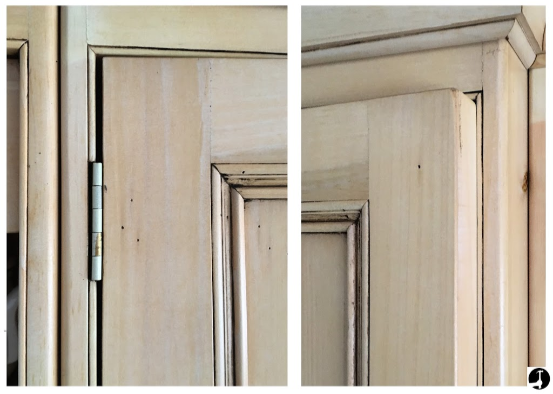
You can adjust a door several different ways and get it swinging and closing properly every time.
Weird, but sometimes if I am working in someones house and I'm not even there for the doors, I'll often fix them so they work properly because it's quick/easy and annoys the hell out of me in my own house!
On this page I'll cover off adjusting cabinet doors, new & old timber doors, plus single, double & bi-fold doors too;
- Adjusting new doors so they work right
- Fixing old doors that have problems, like sagging or that rubs and sticks at the top/bottom
- Fixing a door that won't close
- Fixing doors that don't latch properly when you close them
- How to stop a door from opening or closing on it's own
- How to adjust kitchen cabinet doors in/out and left/right
More often than not when hanging doors they won't initially open and close perfectly and the margins are uneven (you want an even gap between the door and frame all the way around).
A door rarely fits 100% perfect first time and it will need to be adjusted in some way.
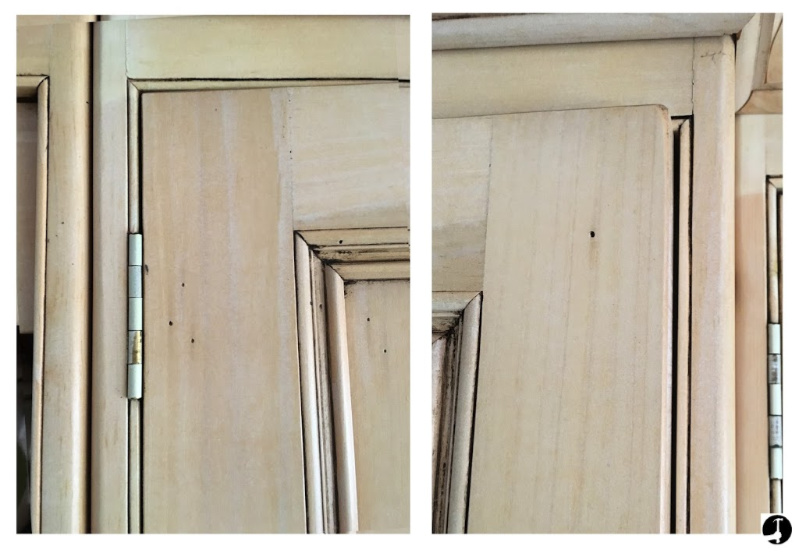
How to adjust sagging doors that don't close because they rub the door frame
Old doors can 'drop', and common problems/symptoms when this occurs are that the top of the handle side of the door hits the top of the frame stopping the door from closing.
It can also be the case in this instance that the handle side starts rubbing on the frame/floor/carpet leaving a mark or rubbing off paint.
More often than not this is because the screws (normally in the top hinge but sometimes all of them) have worked their way loose with the constant weight of the door opening and closing over the years.
| Often when you attempt to tighten these hinge screws they just spin/turn in the hole and don't grip. Over time the threads have pulled through the timber leaving very little for them to grip to. To adjust a door in this instance, I either use better, longer wood screws and try to fix deeper through the frame into the timber stud behind that the frame is fixed to. Alternatively plug the screw holes with a rawl plug or lots of matchsticks. Squirt some PVA wood glue in to the screw holes first then bang in as many match sticks as will fit. Snap off the ends, or cut them off flush with a sharp chisel/knife & screw the hinges back on. | |
How to adjust a door by the hinges for better alignment
It can be the case that a door springs open on its own when you try and close it.
This could be because the hinges are chopped in too deeply, causing the edge of the door and the frame to 'bind' against each other when shutting the door.
Because there is no gap, the door wants to spring back open and this puts the hinge screws under a lot of pressure.
Alternatively it could be the case that the door doesn't bounce but when in the closed position the margins around the doors edge are not equal and it needs to be better aligned in the frame.
In either of these cases you want to adjust a door so it moves left or right and therefore sits more centrally within the frame.Good quality hinges like the ones with washers tend to be thicker so installing some better hinges may solve the problem for you as well (especially if the door is too tight against the frame as they are thicker).
If the gap on the hinge side is too tight, simply unscrew the hinges and put some thin cardboard behind to pack them out and make the hinge side gap larger. This will in turn move the handle side of the door closer to the frame.
If the problem is the opposite, that the gap between the frame and door on the hinge side is too large, chop the hinge deeper into the door and or frame to close the gap slightly (try keeping them flush if possible, so start by chopping in the one that sits most proud if at all).
I fit my door linings so they are a few millimetres too wide for the door. After I have hung the door I can loosen the screws holding the door frame in place and bang small wedges in between the frame and wall. This is why I install the architrave last, it allows me the opportunity to square or straighten the gap around the door first, cut off the wedges, tighten all the screws and then finally install the architraves to cover everything up neatly.
Adjusting a door that is too wide
If after first adjusting the hinges you find the door lining is tight and the door is too wide it will need to be removed and the edge trimmed in most instances with a planer (electric or smoothing hand plane).
If you have a Door Saddle and Block mark the door where it touches the frame, remove it , place in the saddle and plane the doors edge.
If the door just clips the frame as it closes rather than adjust a door in this instance you may get away with just applying a leading edge. A leading edge is planing more off the side of the door edge that closes first, so it is tapered. This allows a tighter gap to be achieved when the door is closed.
You will need to re-paint or stain the door after this step.
Fixing a door that swings open/closed on it's own
To adjust a door that swings open or closed on its own it is probably because the door lining/frame is out of plumb. The easiest way to sort this if you have loose pin hinges is to remove a pin (knock it out with a nail punch) and bend it slightly by hitting it with a hammer to increase the friction, then put it back in.
Otherwise, you can unscrew the lining and move it so it's plumb. Both sides will need to be done in order for it to stay in 'wind'. This may mean more work when you come to fit the architraves, as you'll need to rebate the back of them with an electric plane.
If the door is already finished and decorated you will need to move the hinge and not the frame. If the door swings open on its own, unscrew the bottom hinge (and the middle hinge if it has one).
Next, move the hinge out a little, away from the doorstop and screw it back on. This will leave a little gap where the hinge was chopped in. Check to see the door stays open and that it still shuts properly. If not, the doorstop may need adjusting the same way too.
How to adjust a twisted door or out of wind door frame.
In this instance, when you close the door against the stops, you have to push it quite hard for the latch to locate and hold the door closed. When you push the handle down, it may spring open a bit too.
| This picture is slightly exaggerated, but shows how a door looks when it's twisted, or the frame is 'out of wind'. Sometimes when you close a door the top for example will touch the doorstop and it will feel closed but then you have to push the handle hard for the latch to actually click, locate and hold the door shut. You can check this is the case by standing inside the room and slowly closing the door. As it approaches the stops, slow down and stop as soon as it touches. You should notice instead of it touching evenly all the way up, there is a tapering gap. This is because the door, frame or door stop are 'out of wind' (out of parallel), or the door is twisted (usually from being stored incorrectly). You can't normally 'untwist' it very easily, but you can adjust a door like this so it closes correctly. | |
There are three potential ways to adjust a door in this instance.
- Move the frame which could be the problem
If the decorating hasn't been done yet you might get away with moving the frame a bit which is the most likely cause of the problem. Either that, or the door is twisted in which case you could still move the frame a little to allow for it but it can make the same problem show up somewhere else later (once the architraves are installed).
By unscrewing the frame and moving the top of the hinge side out you can bring the leg so it's parallel with the other one. Trial and error and checking as you go will help get it perfect.
In other instances, it may be easier to leave the door as is and move the doorstop that it closes against instead. Take it off, de-nail it and close the door so it latches shut. Then re-nail the door-stops on leaving a 1-2mm gap all the way around to allow for paint (fix them tighter if no decorating needs doing afterward).
I'm not talking out the window here, if you don't want to cause any re-decorating you can adjust a door by the hinges. Unscrew the top hinge from the frame only and fill the screw holes with matchsticks. Move the hinge away from the doorstop a little, and screw it back up. | |
This will leave a little gap where the hinge is in the frame like the picture below and cause the doors edge to be sticking out from the hinge side of the frame a little when it's closed.
This should help it close better without damaging the paintwork though, and is probably the quickest and easiest way to adjust a door when the frame is out of wind.
How to adjust cabinet door hinges
Kitchen and bathroom cabinet door hinges are really easy to adjust. With a small screwdriver, you can adjust the door left and right, back and forth and up and down as well.
You may need to remove the soft closer or a cover cap if there is one to expose the adjustment screw heads.
1. To adjust cabinet doors up and down: Before I loosen the hinges where they are screwed into the cabinet, I use a sharp pencil to mark the current position of the hinge.
If moving the door higher, I mark the top of the hinge so when moved upwards the pencil line is covered & vice-versa. The door can easily move once loosened so if you don't do this you may not know where you started.
2. To adjust cabinet doors left and right in the cabinet.
Each cabinet hinge has a large grub screw near the centre. They can vary, but usually if you screw it in more, the door moves away from the hinge side and vice-versa. With a little trial and error you will figure it out
3. To adjust a cabinet door back and forth toward/away from the cabinet.
Near the back of the hinge is another screw that when turned left or right will move the door toward/away from the cabinet. Use this to even up double doors especially so the middles are in line with one another.
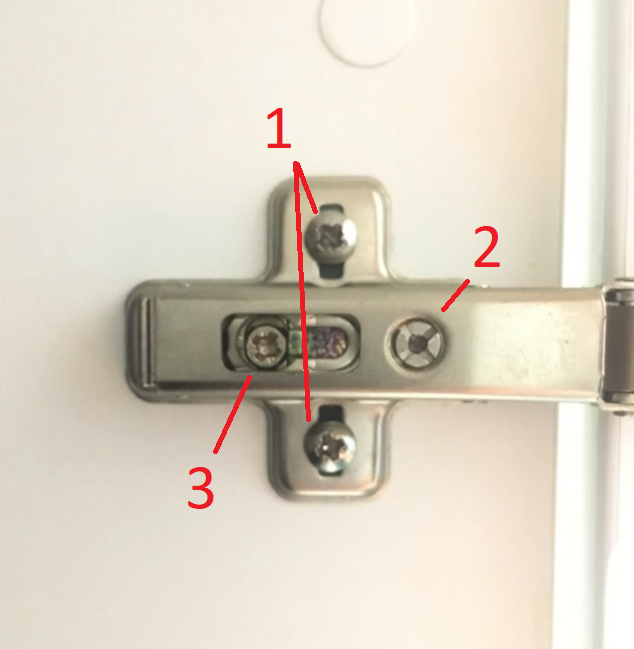
How to adjust bi-fold doors & hinges
Bi- fold doors can be a nightmare to set up right. I try to talk customers out of having them because they are fraught with problems and unless you buy a very expensive high quality track or pre-made setup they are usually disappointing.
The way they work is to have a pivot at the top and on the bottom edge the side where the hinges would normally be. These often have a bracket on the floor with different positions to place the pivot, so moving the pivot point will move the top/bottom of the door towards or away from the frame.
At the top of the frame there will be a track and a guide on the top of the door that slides along the track. The guide is adjustable with two spanners that will lift or lower the doors edge. There may be a cover over the track to remove so you can get to the nuts to tighten or loosen them.
How to adjust a door latch that doesn't locate properly
If none of the above methods work and you need to adjust a door so that it latches correctly, there are a couple of reasons this is normally an issue.
Firstly, because the keep in the frame is too high or low. Close the door slowly and see if the hole in the strike plate is correctly aligned with the latch. If not, chop it in higher or lower depending on which way it needs to go.
You may need to fill the old screw holes with match sticks like I mentioned before so you can screw the strike plate back on without it trying to find the old holes and position in the frame.
The second reason this could be an issue is that the strike plate is too close to the door stops. If the height is correct but the door just bounces off the frame this is most likely the cause.
In this instance, see how I align the strike plate when I install a mortice latch and work backwards to correctly set the distance and re-align the strike plate in the frame.
Have a question or comment about adjusting doors for a better fit?
how to fix an uneven door
Source: https://www.carpentry-tips-and-tricks.com/adjust-a-door.html
Posted by: hemphilldaint1979.blogspot.com

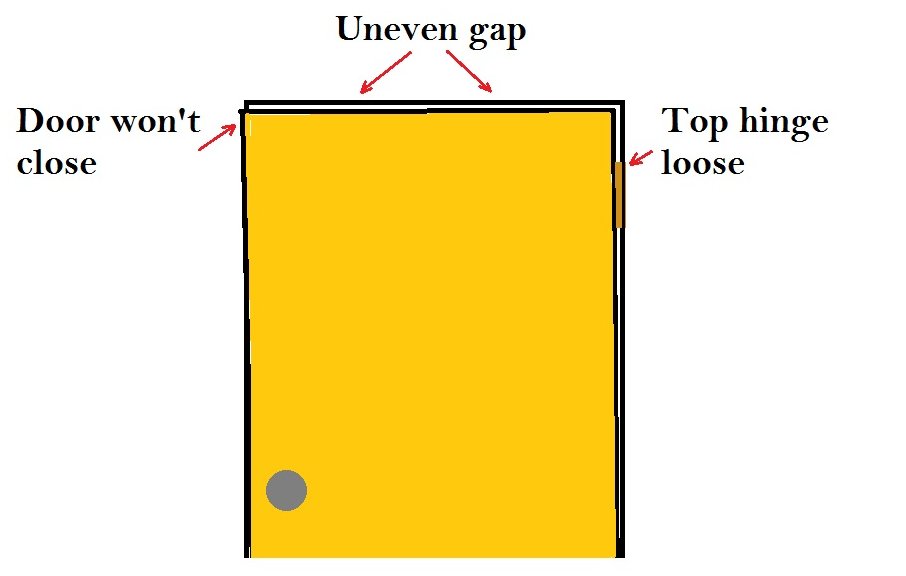
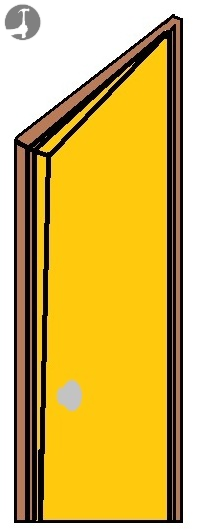
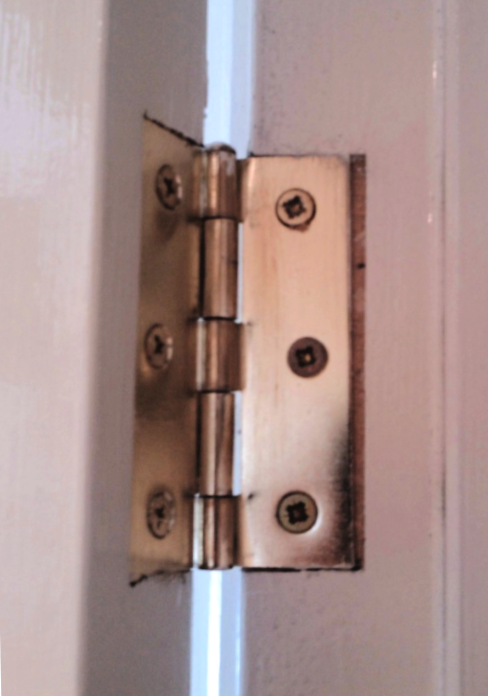
0 Response to "how to fix an uneven door"
Post a Comment